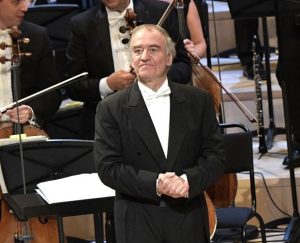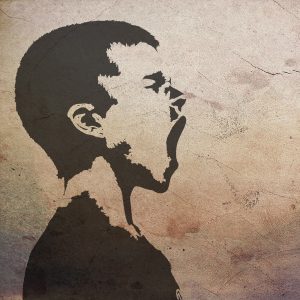23 Jun 2022 | News and features, Russia, Ukraine, Volume 51.02 Summer 2022, Volume 51.02 Summer 2022 Extras

Artistic director of the Mariinsky Theatre Valery Gergiev at the opening of the Zaryadye Concert Hall. Photo: www.kremlin.ru
Since the war started, Ukraine has become a magnet for the global media. As the war has progressed, its voice has become stronger in cultural matters, too. Ukraine has emerged from the shadows of its murderous “brother” and thrust itself into the western imagination, bleeding, yet stoic, full of raw emotion. It stopped being “the Ukraine”. “Kiev” became “Kyiv.”
Western intellectuals and the public suddenly started browsing Wikipedia pages on Ukraine’s history, trying to dissect reasons for its obstinance in the face of the enemy.
The Russia-Ukraine war has many layers. It’s a war of democracy versus authoritarianism. It is a war of blatant propaganda versus principled journalism. It is also a classical colonial war of a metropolis against one of its former subjects. A liberation struggle, extending into the realm of history and culture.
There’s a growing consensus among Ukraine’s cultural elites that this war should become a point of no-return for Russia trying to impose its imperial blueprint on the perception of history and culture of this region, both domestically and internationally.
In the early days of the war, as the first Russian rockets hit the Ukrainian capital, Ukrainian Institute, a young state institution with a mandate to promote Ukraine’s standing in the world through cultural diplomacy instruments, published a manifesto, calling on international partners to stop cooperation with Russia’s state cultural institutions. Similar to weaning itself off Russian energy, the West needs to stop thoughtlessly consuming Russian cultural products, without contextualising them, the Institute said.
As Russian artillery pound Ukrainian cities, London’s leading museums continue feeding the narrative about great Russian culture and history to their audiences. “Fabergé in London: Romance to Revolution”opened at the V&A shortly before the invasion. It profiles “craftsmanship and luxury” of Carl Fabergé, the jeweller of the Russian imperial family. The backdrop of the story is Russia’s imperial history and close ties between both monarchies.
There has since been a pivot. British museums are suddenly showing more willingness towards giving Ukraine agency. London’s National Gallery reviewed its stance on a Degas canvas in its permanent collection, depicting a swirl of dancers in a distinctly Ukrainian traditional attire. “Russian Dancers” became “Ukrainian Dancers”. Tate Modern is currently working on a new exhibition project with Ukraine as its focus, the first of its kind in its history.
Ukraine’s cultural elites and scholars worldwide are determined to seize this moment and to shift the paradigm where imperial hierarchies persist. As it has stood the histories of big countries, mostly former empires, and their cultural figures and phenomena matter more than those of their colonial subjects. This explains why there are so few centres for Ukrainian Studies in the UK (Cambridge being the notable exception), so few translations of Ukrainian literature. No exhibitions in major museums, up until now.
“We cannot cancel Russian culture.” “Pushkin cannot be held responsible for Putin.” “We cannot exclude Russian artists from being invited to residencies and collaborative projects.” “It’s illiberal.” “It smacks of censorship.” These are the arguments often deployed by many intellectuals and creatives in the West. Let us address these concerns one by one.
Placing Russia at the centre of any cultural conversation should not happen without clear articulation of the fact that Russia has used culture for the purposes of aggressive political propaganda internationally. Culture is a broad reflection of the society it represents, and currently Russian society stands largely united behind an ideology promoting violence and blatant untruths.
The new consensus should go beyond the outcome of the Ukraine-Russia conflict and should be about realisation that cultural discourse is unfairly skewed in favour of big and powerful countries, denying many voice and agency. And Ukraine is not alone here.
Our perception of one’s culture is often shaped by a sheer fact of its presence on the cultural scene: through books, theatre productions, films and exhibitions. We often forget that there’s a powerful state machinery propping up this presence and that rogue states – and Russia has become one – weaponise culture and history to political ends, and even use them as a pretext to start a war. To be remembered, the Russian intent behind the killings in Ukraine is to “de-Nazify” the country.
Artists and academics often lack a toolkit to study and bring to the fore cultures previously absent from the discourse. These cultures are absent or underrepresented not for the reasons of uninteresting or lacking value. They are absent because of entrenched cultural hierarchies, intellectual laziness, lack of courage to work with original sources, as well as a long history of suppression of their culture and language by the metropolis.
It is intellectually dishonest and arrogant to place Ukrainian and “good” Russian artists on the same footing by inviting them to speak at the same panel discussion or to apply for funding, for the sake of “reconciliation” and “dialogue”. There can be no reconciliation while the war is still on. It can only start happening after Russia has admitted its guilt and paid reparations for the damage done. Any other framework would mean perpetuation of the colonial discourse.
For another view, read Maria Sorenson’s article as she calls for artists to unite in their opposition to authoritarian regimes and an end to the blanket boycott of Russian culture.
22 Jun 2022 | Events
Join Index on Censorship and Pushkin House for a night discussing freedom of expression in Russia as part of the launch of the latest issue of Index on Censorship magazine.
The 2022 summer magazine looks at how the Russian invasion in Ukraine impacts freedoms within Ukraine and across Europe, Turkey and Russia. While the pages are filled with stories of brave and brilliant people speaking up and out, many write on the growing challenges for freedom of expression. This is especially the case for those living in Russia under Vladimir Putin. This will be the topic of our discussion for the launch.
Featuring a panel of people with direct experience and knowledge of Russia under Putin, the evening will address how much freedom there is in Russia right now, particularly in relation to media freedom and protest.
The panel will include Russian investigative journalists Andrei Soldatov and Irina Borogan, as well as Ben Noble, Associate Professor in Russian Politics at University College London. The conversation will be chaired by Index on Censorship magazine Editor-In-Chief Jemimah Steinfeld. The event will also include a reading of a passage written by the late Russian journalist Anna Politkovskaya, who was murdered in Moscow in 2006.
A wine reception will follow.
This event is free, but seats are limited. Advanced booking is essential. Register for your ticket here.
MEET THE SPEAKERS
 Andrei Soldatov is a Russian investigative journalist, co-founder, and editor of Agentura.ru, a watchdog of the Russian secret services’ activities.
Andrei Soldatov is a Russian investigative journalist, co-founder, and editor of Agentura.ru, a watchdog of the Russian secret services’ activities.
He is co-author with Irina Borogan of The New Nobility. The Restoration of Russia’s Security State and the Enduring Legacy of the KGB (PublicAffairs, 2010), The Red Web: The Struggle Between Russia’s Digital Dictators and the New Online Revolutionaries (PublicAffairs, 2015) and The Compatriots: The Brutal and Chaotic History of Russia’s Exiles, Émigrés, and Agents Abroad (PublicAffairs, 2019).
 Irina Borogan is a Russian investigative journalist, co-founder and deputy editor of Agentura.ru, a watchdog of the Russian secret services’ activities. She chronicled the Kremlin’s campaign to gain control of civil society and strengthen the government’s police services under the pretext of fighting extremism.
Irina Borogan is a Russian investigative journalist, co-founder and deputy editor of Agentura.ru, a watchdog of the Russian secret services’ activities. She chronicled the Kremlin’s campaign to gain control of civil society and strengthen the government’s police services under the pretext of fighting extremism.
She is co-author with Andrei Soldatov of The New Nobility. The Restoration of Russia’s Security State and the Enduring Legacy of the KGB (PublicAffairs, 2010), The Red Web: The Struggle Between Russia’s Digital Dictators and the New Online Revolutionaries (PublicAffairs, 2015) and The Compatriots: The Brutal and Chaotic History of Russia’s Exiles, Émigrés, and Agents Abroad (PublicAffairs, 2019).
 Dr Ben Noble is Associate Professor of Russian Politics at University College London (UCL SSEES) and an Associate Fellow of Chatham House. His research focuses on legislative politics, authoritarianism, and Russian domestic politics, with awards from The Leverhulme Trust, the Political Studies Association, and the British Academy. His co-authored book Navalny: Putin’s Nemesis, Russia’s Future? (Hurst and Oxford University Press, 2021) has so far been translated into eight languages, was selected by the Financial Times as one of the best books on politics in 2021, and has been shortlisted for the Pushkin House Book Prize in 2022. Ben frequently provides commentary and analysis on Russian politics for academic, policy, media, and general audiences.
Dr Ben Noble is Associate Professor of Russian Politics at University College London (UCL SSEES) and an Associate Fellow of Chatham House. His research focuses on legislative politics, authoritarianism, and Russian domestic politics, with awards from The Leverhulme Trust, the Political Studies Association, and the British Academy. His co-authored book Navalny: Putin’s Nemesis, Russia’s Future? (Hurst and Oxford University Press, 2021) has so far been translated into eight languages, was selected by the Financial Times as one of the best books on politics in 2021, and has been shortlisted for the Pushkin House Book Prize in 2022. Ben frequently provides commentary and analysis on Russian politics for academic, policy, media, and general audiences.
 Jemimah Steinfeld is the editor-in-chief at Index on Censorship. Prior to Index she lived in China. She is the author of the book Little Emperors and Material Girls: Sex and Youth in Modern China, and has written for a variety of publications, including The Guardian, The Telegraph, The Independent, CNN, New Statesman and openDemocracy. She can be found tweeting @JFSteinfeld.
Jemimah Steinfeld is the editor-in-chief at Index on Censorship. Prior to Index she lived in China. She is the author of the book Little Emperors and Material Girls: Sex and Youth in Modern China, and has written for a variety of publications, including The Guardian, The Telegraph, The Independent, CNN, New Statesman and openDemocracy. She can be found tweeting @JFSteinfeld.
When: Monday 18 July 2022, 7pm
Where: Pushkin House, 5a Bloomsbury Square, London WC1A 2TA
22 Jun 2022 | News and features, Russia, Ukraine, Volume 51.02 Summer 2022, Volume 51.02 Summer 2022 Extras
In the dark times
Will there be singing?
Yes, there will be singing
About the dark times.
Bertolt Brecht, motto to Svendborg Poems 1939
For someone who has by now lived most of my adult life in the West but grew up in Belarus – a country that borders both Ukraine and Russia – these have certainly been dark and turbulent times.
The horror of what people in Ukraine are going through is heart-breaking. It is also confusing if my own country of birth is viewed as an aggressor or a victim.
Should people who have bravely protested in hundreds of thousands in 2020 and paid a very high price for it be now equated to the regime that rules them? Does Belarus, the country and the people, mean Lukashenka? What about Russia? The support for Putin is undoubtedly bigger there. But does Russia and Russian culture mean Putin?
Having always been a passionate advocate of freedom of expression under the most trying of conditions, what to make now of the blanket censorship of Russian and Belarusian artists not in Russia and Belarus… but in the West?
When the horror of the invasion of 24 February sank in, the Western cultural scene was immediately rocked by a succession of cancellations and calls for boycotts. Some of them were easier to understand and justify than others.
Opera singer Anna Netrebko and conductor Valery Gergiev have been tied to Putin’s regime and identified as representatives of his soft power: association with them became too toxic for Western cultural institutions. Recently, the evidence of oligarchic wealth accumulated by Gergiev due to his political connections has also come to light. This made any defence of him even more difficult
Art in some ways has always been held hostage. The authoritarian Soviet regime used the prestige of the Bolshoi and the power of Russian culture as soft power.
One is reminded of a powerful 1968 performance by cellist Mstislav Rostropovich at the BBC Proms in London where he performed – intitally to the calls of protest and with tears streaming down his face – a tortured and impassionate piece of music by a Czech composer Antonin Dvorak on the day Soviet tanks rolled into Czechoslovakia to crush the Prague Spring.
His wife, the opera singer Galina Vishnevskaya, recalled the event in her autobiography:
“In the hall, six thousand people greeted the appearance of Soviet artists with long unceasing cries, stomping, whistling, preventing the concert from starting. Some shouted: ‘Soviet fascists, get out!’ Others: ‘Shut up, the artists are not to blame!’
“Slava (his nickname) stood there completely pale, absorbing the shame for his criminal government, and I, closing my eyes and not daring to raise my head, huddled in the far corner of the viewing box. But then, finally, the hall fell silent. Dvořák’s music poured over the people like a requiem, and Rostropovich, shedding tears, spoke through his cello.
“The hall froze, listening to the confession of the great artist, who at that moment, together with Dvořák merged with the very soul of the Czech people, suffering with him and with them asking his forgiveness and praying for them.
“As soon as the last note played, I rushed backstage to Slava. Pale, with trembling lips, having not yet recovered from his experience on stage, with eyes full of tears, he grabbed my arm and dragged me to the exit:
“‘Let’s go to the hotel, I can’t see anyone.’
“We went out into the street – the demonstrators were shouting there, waiting for the musicians of the orchestra to express their indignation to them.
“Seeing the two of us, they suddenly fell silent and parted in front of us. In the ensuing silence, not looking at anyone, feeling like criminals, we quickly walked to the car waiting for us and, returning to the hotel, we could finally give vent to our despair.
“But what could we do? We did the only thing that was in our power – got drunk.”
What then should the answer to this moral dilemma be? Should musicians and artists be allowed to perform only once they have stated their opposition to their government?
And is it then morally justifiable from the point of view of Western democracies to put someone living under completely different conditions in that position? To demand dissent from someone who might not be in the position to speak freely?
The German music critic Jan Brachmann gives the example of Dmitri Shostakovich, who, in 1949, appeared at a Soviet-backed peace conference in New York, having been pressured by Stalin into attending.
The émigré Russian composer Nicolas Nabokov publicly interrogated Shostakovich about Soviet denunciations of modernist music, even though he knew that his colleague could not speak his mind. Shostakovich muttered, barely audible: “I fully agree with the statements made in Pravda.”
It is unclear what exactly had been gained from that exercise. But Gurgiev aside and any moral clarity there notwithstanding, there have been other, much less clear-cut cases recently.
Sergei Loznitsa, one of Ukraine’s most prolific filmmakers, who has explored the Maidan uprising, the Donbass war, Stalin’s personality cult and the tragedy behind the Babyn Yar massacre, has recently been expelled from the Ukrainian Film Academy for speaking out against blanket boycott of Russian filmmakers.
His opposition is based on the fact that people should be judged by their actions not their passports. It is hard to disagree. People can still love their country and feel deeply ashamed of their government’s actions.
Kirill Serebrennikov, a Russian dissenting artist of great talent, is currently also in the line of fire.
Serebrennikov, who had his homoerotic production, Nureyev, taken off stage at Bolshoi in 2017, was placed under house arrest accused of embezzling theatre funds – a charge widely seen as being politically motivated. He was not allowed to attend a premiere of his production of Cosi Fan Tutte at Zurich Opera nor to the Cannes premiere of his hugely acclaimed ode to rock ‘n’ roll and dissent in 1980s Leningrad, Leto.
Recently Bolshoi has once again cancelled a scheduled production of Nureyev, this time as a retaliation for him speaking up against the war. Serebrennikov told France 24 in an interview last month that “it’s quite obvious that Russia started the war”, and that it was breaking his heart.
“It’s war, it’s killing people, it’s the worst thing (that) ever might happen with civilisation, with mankind… It’s a humanitarian catastrophe, it’s rivers of blood,” he said.
And yet the Ukrainian State Film Agency opposed Serebrennikov’s inclusion in Cannes Film Festival and the premiere of his new film on the grounds that he is a Russian filmmaker, and it was unacceptable in times of war. While this reaction is humanly understandable and can even be seen by some as a moral decision, we need to ask ourselves who ultimately benefits from silencing, cancelling, de-platforming and similar methods? It is never a viewer, a reader or any ordinary person.
The power of art is in our shared humanity and not in division. Art and its healing power is what gets us through the hard and dark times. We need to show solidarity with people in Ukraine and Ukrainian artists, shine a spotlight on their experiences and prioritise their voices, as well as support those who struggle under authoritarianism in their own countries. This is a task for any functioning democracy.
Having started by quoting Bertolt Brecht, another quotation, this time by the Soviet dissident Alexander Solzhenitsyn comes to mind: “The line separating good and evil passes not through states, nor between classes, nor between political parties either – but right through every human heart – and through all human hearts.”
This article appears in the forthcoming summer 2022 edition of Index on Censorship. Get ahead of the game and take out a subscription with a 30% discount from Exact Editions using the promo code Battle4Ukraine.
For another view, read Marina Pesenti’s article where she argues that promoting Russian culture risks furthering Putin’s agenda.
10 Jun 2022 | Belarus, Brazil, China, Hong Kong, Opinion, Philippines, Russia, Ruth's blog, Ukraine, United Kingdom, United States

This week has been awful.
The news has been devastating and all consuming. But that feels like it’s becoming the norm.
In Belarus, our friends remain under attack – Andrei and Irina’s trial began on Monday. We have no idea of the outcome.
In Brazil, Dom Phillips and his colleague Bruno Araújo Pereira remain missing – but with reports of fresh blood being found, our hearts break for their loved ones.
In Ukraine, we see daily the death and destruction caused by the Russian invasion, up to 200 Ukrainian soldiers killed a day. And the reports of cholera in Mariupol are beyond my comprehension in the twenty-first century.
In Russia, the crackdown against dissidents continues unabated – with limited coverage. 160 people are currently defending criminal cases for anti-war statements and this week a close associate of Alexei Navalny was tried in absentia and placed on the international wanted list.
In the Philippines, Ferdinand Marcos Jr has been elected as the next President and made his first visit to the US as President-Elect – seemingly the legacy of his parents no longer an electoral or diplomatic issue.
In Hong Kong, six brave democracy protesters were arrested for the temerity of marking the anniversary of Tiananmen Square.
In the US – the inquiry into the Capitol Riot is officially underway – highlighting just how fragile our collective democracy is and how desperately we need to cherish and protect it.
And that’s before I even touch on what is happening in the UK, the ongoing political crises, and the ideologically incoherent approach to freedom of expression protections.
And in too many countries this is now framed through the prism of a cost-of-living crisis as a scale that we haven’t seen for a generation.
My only comfort is that we know what is happening. In a digital age it is very difficult for any leader, however repressive, to completely silence dissent about their domestic actions. The joy of a free press in democratic countries is that it enables us to be informed and to demand more and better – from our own leaders and from those that claim a global role. It enables us to analyse the scale of the threat and to try and prioritise our efforts in assisting those brave enough to stand against tyranny.
Index exists to provide a platform for the persecuted. We work every day with those who refuse to be silenced. The least we can do is listen to them and then join their fight.


 Andrei Soldatov
Andrei Soldatov  Irina Borogan
Irina Borogan Dr Ben Noble
Dr Ben Noble Jemimah Steinfeld
Jemimah Steinfeld